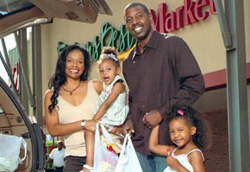Black like nobody’s business

In 2009, John and Margarita “Maggie” Anderson, an affluent black couple living in Oak Park, Illinois, embarked on a year-long “Empowerment Experiment.” They’d resolved to spend an entire year patronizing black-owned businesses exclusively. That experiment is the focus of a book by Maggie Anderson published just four days ago — Our Black Year.
What follows is excerpted from “Marketplace” host Kai Ryssdal’s February 14 interview with the Andersons, during which Maggie Anderson talks about visiting a black business owner who’d mistaken her on the phone for “an Oak Parker — not another sister” …
![]()
Ryssdal: Well it was interesting, because you confess in your book that you changed the way you spoke to her a little bit, once you got into that environment.
Maggie Anderson: If you have this conversation with more middle-class African-Americans, you’re going to see that we do that all the time.
Ryssdal: Well this is the thing that’s going to get us emails calling me a horrible person, but you don’t sound black over the phone, right?
John Anderson: Well, we’re using our phone and radio voices.
Maggie Anderson: No, this is how we talk to each other, and our friends.
John Anderson: Yeah, we used to call it ‘lapsing into the dialect.’
Maggie Anderson: Yes. But when we want to make sure we’re connecting, we do lapse every once in a while.
![]()
Ryssdal’s observation that Maggie Anderson doesn’t “sound black over the phone” offended many listeners. True story.
Which makes me wonder what we’re supposed to do with Anderson’s admission that she and her husband sometimes deliberately lapse into “the dialect.” Could it be that, under certain circumstances, the cause of racial equality is advanced by denying that an identifiably black way of speaking exists?
I do wonder if we’ll ever stop gerrymandering the line between diversity and difference. One is good and one is bad, I gather, but for the life of me, the message is so mixed these days that I can hardly tell them apart.